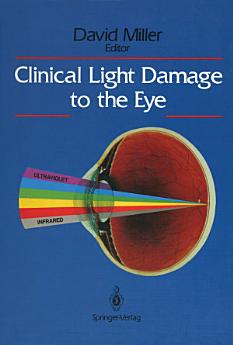Clinical Light Damage to the Eye
David Miller
2012 ഡിസം · Springer Science & Business Media
ഇ-ബുക്ക്
225
പേജുകൾ
reportറേറ്റിംഗുകളും റിവ്യൂകളും പരിശോധിച്ചുറപ്പിച്ചതല്ല കൂടുതലറിയുക
ഈ ഇ-ബുക്കിനെക്കുറിച്ച്
To my mind, the superoxide radical discovered by Linus Pauling more than 50 years ago is about to become a major issue in Ameri can medicine. Uncannily, Pauling's early focus on vitamin C has pointed the way to the whole catalogue of free-radical scavengers, which we in medicine will be using in the coming decade. In ophthalmology, the basic scientists have been talking about the role of free-radical induction by light for some time. They have accumulated an increasing amount of evidence supporting the idea that prolonged light exposure contributes to cataract development and retinal degeneration. Through Clinical Light Damage to the Eye, we hope to bring this message to the practicing ophthalmolo gist. Because Dr. Pauling's work bears so strongly on the key issue of free-radical damage, and because of my own great respect for him as a scientist and a man of rare courage, I invited Dr. Pauling to write the foreword to Clinical Light Damage to the Eye, which follows.
രചയിതാവിനെ കുറിച്ച്
Linus Pauling was born on February 28, 1901 in Portland, Oregon. He never received a high school diploma because he dropped out of Washington High School in Portland as a form of protest against taking courses he regarded as pointless. Despite not having a high school diploma, he received a B. S. in chemical engineering from Oregon Agricultural College in 1922 and a Ph.D. from California Institute of Technology in 1925. He did research and taught at the California Institute of Technology from 1922 to 1963, was a research professor at the Center for the Study of Democratic Institutions in California from 1963 to 1967, taught at the University of California, San Diego until 1969, and then taught at Stanford University, where he was forced to retire after his 70th birthday. After leaving Stanford, he set up the Linus Pauling Institute of Science and Medicine. He received the Nobel Prize for chemistry in 1954, as a result of his research into the nature of the chemical bond, the force that gives atoms the cohesiveness to form the molecules that in turn become the basis of all physical matter. Around 1960, he began a campaign to obtain the signatures of scientists opposed to nuclear testing. A total of 11,021 scientists in 49 countries signed the petitions. He received the Nobel Prize for peace in 1962 for his work since 1946 "not only against the testing of nuclear weapons, not only against the spread of these armaments, not only against their very use, but against all warfare as a means of solving international conflicts." He wrote several books during his lifetime including The Nature of the Chemical Bond, His No More War, and Vitamin C and the Common Cold. He died from cancer on August 19, 1994 at the age of 93.
ഈ ഇ-ബുക്ക് റേറ്റ് ചെയ്യുക
നിങ്ങളുടെ അഭിപ്രായം ഞങ്ങളെ അറിയിക്കുക.
വായനാ വിവരങ്ങൾ
സ്മാർട്ട്ഫോണുകളും ടാബ്ലെറ്റുകളും
Android, iPad/iPhone എന്നിവയ്ക്കായി Google Play ബുക്സ് ആപ്പ് ഇൻസ്റ്റാൾ ചെയ്യുക. ഇത് നിങ്ങളുടെ അക്കൗണ്ടുമായി സ്വയമേവ സമന്വയിപ്പിക്കപ്പെടുകയും, എവിടെ ആയിരുന്നാലും ഓൺലൈനിൽ അല്ലെങ്കിൽ ഓഫ്ലൈനിൽ വായിക്കാൻ നിങ്ങളെ അനുവദിക്കുകയും ചെയ്യുന്നു.
ലാപ്ടോപ്പുകളും കമ്പ്യൂട്ടറുകളും
Google Play-യിൽ നിന്ന് വാങ്ങിയിട്ടുള്ള ഓഡിയോ ബുക്കുകൾ കമ്പ്യൂട്ടറിന്റെ വെബ് ബ്രൗസർ ഉപയോഗിച്ചുകൊണ്ട് വായിക്കാവുന്നതാണ്.
ഇ-റീഡറുകളും മറ്റ് ഉപകരണങ്ങളും
Kobo ഇ-റീഡറുകൾ പോലുള്ള ഇ-ഇങ്ക് ഉപകരണങ്ങളിൽ വായിക്കാൻ ഒരു ഫയൽ ഡൗൺലോഡ് ചെയ്ത് അത് നിങ്ങളുടെ ഉപകരണത്തിലേക്ക് കൈമാറേണ്ടതുണ്ട്. പിന്തുണയുള്ള ഇ-റീഡറുകളിലേക്ക് ഫയലുകൾ കൈമാറാൻ, സഹായ കേന്ദ്രത്തിലുള്ള വിശദമായ നിർദ്ദേശങ്ങൾ ഫോളോ ചെയ്യുക.








